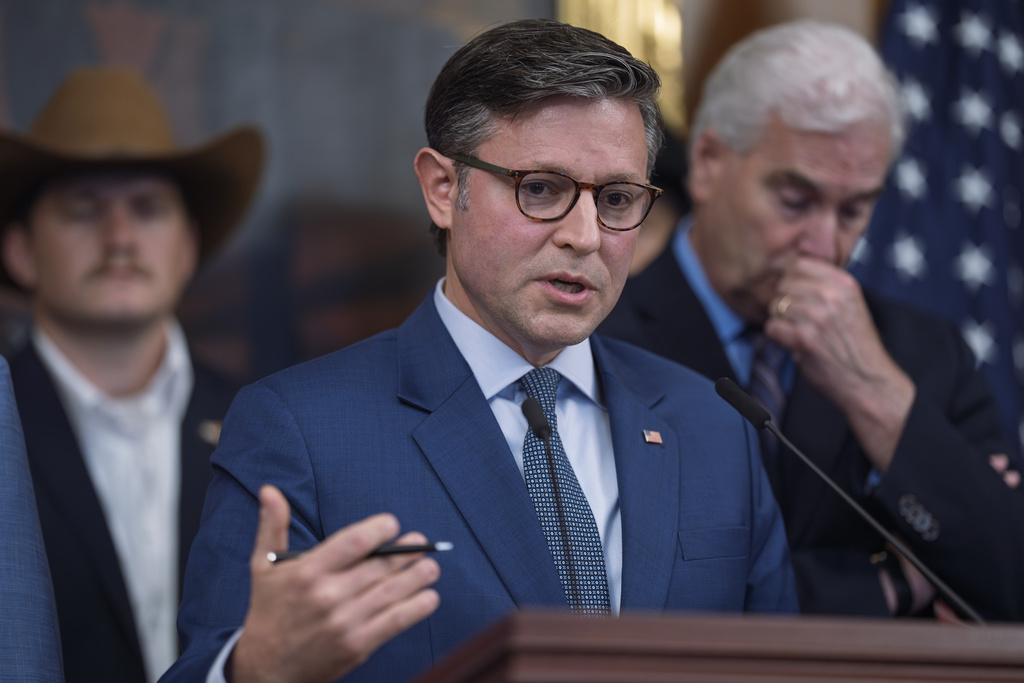Republican controlled Senate rejects bills to fund government, increasing risk of shutdown on Oct. 1

Speaker of the House Mike Johnson, R-La., talks about the killing of conservative activist Charlie Kirk and defended employers who take action against their workers whose comments go too far, at the Capitol in Washington, Tuesday, Sept. 16, 2025. (AP Photo/J. Scott Applewhite)
WASHINGTON (AP) — The Senate rejected competing measures on Friday to fund federal agencies for a few weeks when the new budget year begins on Oct. 1, increasing prospects for a partial government shutdown on that date.
Leaders of the two parties sought to blame the other side for the standoff. Democrats accused Republicans of not negotiating with them to address some of their priorities on health care as part of the funding measure, even though they knew Democratic votes would be needed to get a bill to the president’s desk.
Republicans said Democrats were making demands that would dramatically increase spending and were not germane to the core issue of keeping agencies fully running for a short period of time while negotiations continued on a full-year spending package.
It’s unclear how the two sides will be able to avoid a shutdown. Republicans are planning on what amounts to a do-over vote on their proposal close to the deadline in the hopes that more Democrats will have second thoughts. Democrats are repeating their demand that Republicans sit down with them and work on a compromise.
“The theater must end,” Senate Democratic Leader Chuck Schumer, D-N.Y., said after the vote. “Let’s sit down and negotiate.”
Senate Majority Leader John Thune, R-S.D., gave no indication of a change in course.
“All it takes is a handful of Democrats to join the Republicans in keeping the government open and funded, and to ensure we have a chance to get the appropriations process completed in the way it was intended,” Thune said.
House Republicans unify behind a short-term bill
The Senate action came after the House earlier in the day passed the Republican-led funding bill. The measure would extend government funding generally at current levels for seven weeks. The bill would also add about $88 million in security funding for lawmakers and members of the Supreme Court and executive branch in the wake of the assassination of conservative activist Charlie Kirk.
The vote was 217-212. Rep. Jared Golden of Maine was the lone Democratic member to support the bill. Rep. Marie Gluesenkamp Perez, D-Wash., also said she tried to vote for the bill but was not recognized by the presiding officer. She was listed officially as not voting.
House Speaker Mike Johnson of Louisiana said he knew he had few votes to spare as he sought to persuade fellow Republicans to vote for the funding patch, something many in his conference have routinely opposed in past budget fights. But this time, GOP members saw a chance to portray the Democrats as responsible for a shutdown.
“The ball is in Chuck Schumer’s court. I hope he does the right thing. I hope he does not choose to shut the government down and inflict pain on the American people,” Johnson said.
President Donald Trump had urged House Republicans to pass the bill and put the burden on Democrats to oppose it. GOP leaders often need Trump’s help to win over holdouts on legislation.
Trump predicted Friday that there could be “a closed country for a period of time.” He said the government will continue to “take care” of the military and Social Security payments in a closure.






